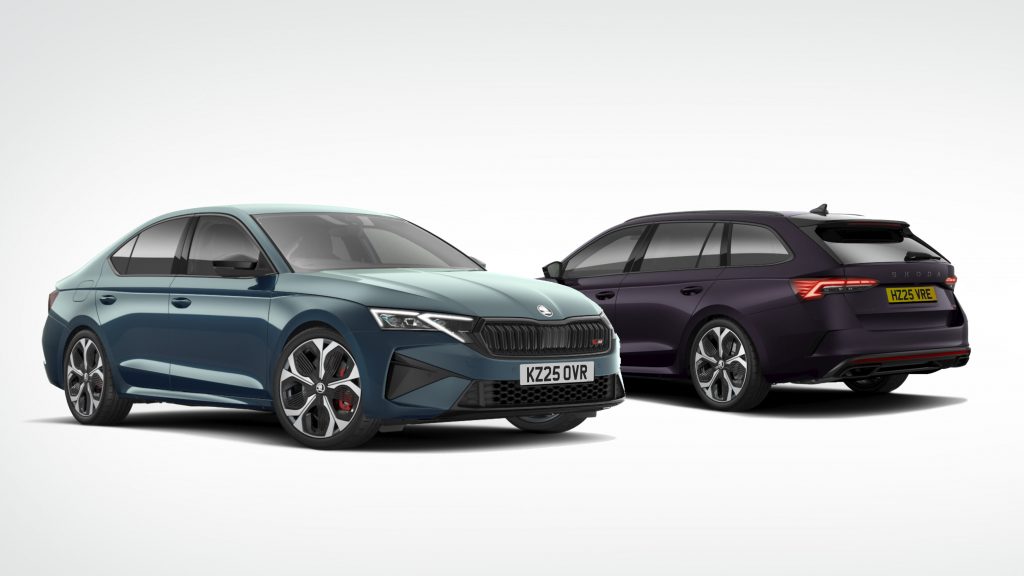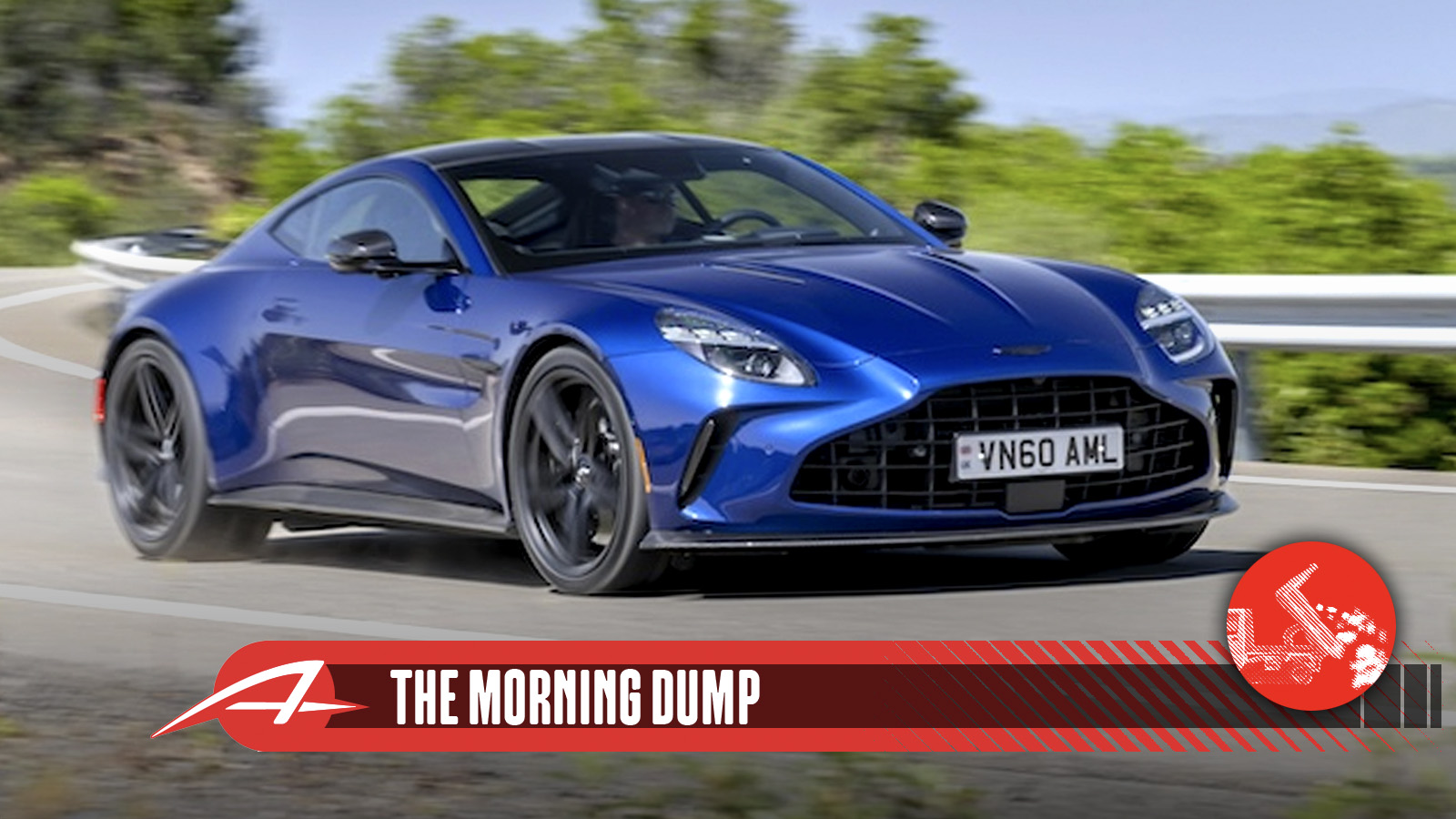The long-running assumption has been that wealthy car buyers are less sensitive to price swings caused by tariffs, which is true, but the swings also feel a lot bigger. If you’re buying a $400,000 car and it’s now $50,000 more expensive, you’re going to notice. Registration data does indeed show a slowdown for certain luxury and exotic brands.
It’s also bad times for Porsche, due to both the tariffs and what’s going on in China right now. The Morning Dump isn’t going to be all politics, because that’s not fun, but the United States is about to put huge duties on Chinese graphite imports, which could cause some issues for battery makers who rely on the stuff.
Here’s something fun: Škoda has new colors for its Octavia vRS. That’s a great way to end the week.
‘It’s Incredibly Frustrating,’ Says Luxury And Exotic Car Dealer

My suspicion is that some of you may not be extremely sympathetic to someone who can afford a $300,000 exotic car, but car people are car people, and buying an exotic can sometimes be a long process. In many cases, a buyer might wait more than a year to finally get their car, and it’s an unpleasant surprise to find that the $300,000 you expected to spend is now $360,000.
With tariffs, luxury and exotic car companies are in a weird position. On one hand, if you have $700,000 to spend on a car, you probably have $840,000 for a car. On the other hand, just because you have that money doesn’t mean you necessarily want to part with it. One way to get $840,000 is by not wasting your money.
Also, most luxury and exotic car companies build those cars in Europe. That’s the appeal. When you buy a Ferrari, you’re buying a car built in Italy. And Italy is in the EU, and the EU is currently being targeted with automotive tariffs. This is causing problems for luxury car customers and dealers, as luxury and exotic dealer Robert DiStanislao tells Automotive News:
“It’s incredibly frustrating,” DiStanislao said. “Because of the uncertainty, people are canceling orders and don’t know how to proceed. It’s ruining confidence on a multitude of levels. Every market is offset by this. Everything we sell is not a necessity. It’s a luxury. It’s daunting.”
New-vehicle sales are down overall at DiStanislao’s stores, partly because automakers have reduced output, he said.
[…]
“We have to convince them to stay in,” DiStanislao said. “They’re seeing their 401(k)s go up and down. By and large, we’ve kept most of them together. But it doesn’t take much to where the bloom is off the rose. We can’t take the fun out of it.”
The numbers support what DiStanislao is sensing from customers. S&P Global Mobility registration data shows Aston Martin sales down 16%, Maserati down 41%, Ineos down 12%, and even Ferrari down 2.5%. On the flipside, the new Lamborghini Revulto is getting to customers, so sales were up 15%.
Right now, English companies that build cars in England are subject to a lower tariff and should be fine. There are always more Ferrari buyers than Ferrari cars, so I doubt they’re sweating it in Maranello. Ineos is an interesting case as it’s ostensibly a British truck, but it’s built in France and is thus subject to EU tariffs (the company’s CEO apparently supported Brexit, so…).
If the EU gets a deal close to the UK’s 10% tariff, then this shouldn’t be much of an issue long-term, but that’s a massive IF.
Conditions Have ‘Deteriorated Massively’ At Porsche, Says CEO

Oliver Blume is both the CEO of Volkswagen Group and Porsche. Historically, I’d say that being CEO of Porsche is more fun than being on top of VW. These days? I’m less sure. Porsche is being hit by three simultaneous existential threats:
- Chinese consumers aren’t as obsessed with the Porsche brand as they used to be. Instead, they’re into companies like Xiaomi.
- The company invested heavily in electrification, but the market hasn’t exactly rewarded that investment either in the United States or China.
- The company faces a tariff threat in the United States and, also, the ongoing risk of China putting tariffs on European cars with larger engines.
Or, here’s how Blumer put it in a letter to employees, via Manager Magazin:
Blume, who is also Volkswagen CEO, wrote: “In the negotiations on a second package of measures, the Board of Management and the Works Council will develop solutions together.” An important basis for this is that this happens respectfully, confidentially and behind closed doors.
The business model that has sustained the company for many decades no longer functions in the same way, Blume continues. “Our framework conditions have deteriorated massively in a short period of time.” Furthermore, electromobility is developing much more slowly in many markets than the automaker and many experts had expected years ago. “All of this is hitting us hard. Harder than many other automakers. We are facing a ‘crisis of the framework conditions.'”
Clearly there is only one answer: Bring back the 912 and build it in Tennessee.
Chinese Graphite Getting Hit With 93.5% Anti-Dumping Levy

Most of the time when I talk about batteries, I’m talking about cathode chemistry. Will a battery use NCM, or LFP, or some other exotic mix of the above? What I don’t talk much about is anode chemistry, because almost all those batteries use graphite for the anode. As anyone who has used a pencil knows, graphite isn’t hard to come by. The problem is, China got great at making graphite that’s good enough to be used in batteries, so few other countries even tried.
Can you see where this is going?
Per Bloomberg, a proposed tariff of 93.5% on Chinese graphite is going to have a big hit on some battery makers, especially because that’ll end up being a 160% tariff when combined with existing levies:
The tariff would be a blow to manufacturers, said Sam Adham, head of battery materials at consultancy CRU Group. A 160% tariff equates to $7 per kilowatt-hour added cost to an average EV battery cell, or one fifth of the manufacturing tax credits that originated in the Inflation Reduction Act and survived President Donald Trump’s budget bill, he said.
“That basically wipes out profits for one or two entire quarters for the Korean battery makers,” Adham said.
Tesla Inc. and its key battery supplier, Japan’s Panasonic Inc., were among companies pushing to block the new tariffs, arguing that they rely on Chinese graphite imports because the domestic industry hasn’t developed enough to meet the quality standards and volume that the carmaker requires. Tesla shares fell as much as 0.7% Thursday.
I’m sure the President will jump in to save Tesla.
You Can Now Get Your Škoda In Fun New Colors

Well, this is fun. I’m a huge fan of the Škoda Octavia vRS, which is the hotted-up version of the Czech automaker’s sedan/wagon combo. While it only has around 270 horsepower, that’s plenty for the mean streets of Prague.
The company had a competition to see what the next car colors should be, and Space Violet and Water World Green were victorious. I think there should be more green and purple cars, so I’m supportive. The colors can be had for an extra 855 quid if you’re in the market.
Also, if anyone buys one of these in a fun color, I’ll send you an Autopian grille badge… for free! This only applies to the first couple of owners in case 100 of you were thinking about buying an Octavia this month.
What I’m Listening To While Writing TMD
I was going to do the new one from The Last Dinner Party or Wet Leg this morning, but for some reason, I’ve decided to cheat on my British ladies with some British gents. Please enjoy Coldplay’s “Spies.” You know David will.
The Big Question
Which exotic or luxury car do you think is most likely to get cancelled?
Top photo: Aston Martin









Says a lot about Chinese car culture when Porsche enthusiasts there now prefer appliances with wheels.
“Only 270 horsepower”? What a world we live in… what a time to be alive.
But yes, more green and purple cars. I’m not as Skoda proficient as some of you, plus it’s VW roots would give me pause even if they were sold in America (I’ve owned a number of VWs and feel like I’ve had my fill at this point) but I’d LOVE that sharp little wagon in either green or purple. 🙂
I’d take the purple one even though a wagon is more car than I need.
Maserati has been living dangerously for some time now so I would not be surprised if they are in trouble soon.
How does the Administration calculate the cost of manufacturing graphite in China?
What makes them think that China would export the raw materials at a loss to countries that compete in manufacturing batteries or are they stupid?
What domestic manufacturers of graphite is the administration trying to protect at the expense of domestic battery manufacturers, or are they stupid?
Is the administration aware that generally industrial countries import raw materials and manufacture goods from them because that’s where the money is, or are they stupid?
Do they want to support manufacturing in the USA or, well, you get the point, but boy are they stupid.
Perhaps it’s all supposed to be a distraction from raping 13-year-olds with his friend, but otherwise it’s pretty stupid.
Calculate? This administration?
They are slinging their poo against a wall and coming up with numbers based off their interpretations of it. Which is to say they are stupid. Very, very stupid.
Yes. They are stupid.
“or are they stupid?”
Yes, yes, yes, and YES!
I’ll take a purple wagon, please!
Skoda Skoda Skoda!!!!
It’s not just the tariffs – it’s the general uncertainty of Trump’s chaos.
His nonsense is absolutely affecting my job – my company does a LOT of work with government and higher education that is being very, very affected. The enterprise side of it is being affected too. Money is not being spent due to the uncertainty. It’s also affecting real estate values. His meddling with FEMA is not giving insurance companies the warm fuzzies either. And his inflationary tariffs are helping keep interest rates high too.
Doing some work in a VA back when cuts were first happening, the standard greeting response of “living the dream” had quickly been replaced with “well I am still here.” Purchasing has definitely become much more tentative too.
Yeah. For an administration run by a bunch of businessmen, they sure don’t seem to understand that businesses hate uncertainty more than anything else.
Thanks for the Škoda bit of this, because everything else was pretty depressing. I just kind of want to go Rip Van Winkle for the rest of the Trump administration or move to another country. But I can’t, having to help take care of my 89-year-old mother.
Be a good kid…take her with you.
She likes him. And most of what he’s doing. She also has dementia.
Nothing to add except good choice of song.